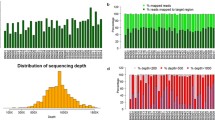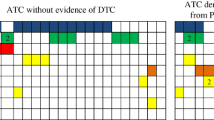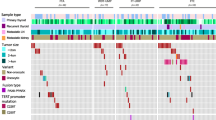Abstract
Introduction
The Thyroid Cancer Genome Atlas (TCGA) was a major project that significantly clarified the key underlying genetic aberrations in papillary thyroid cancer. It confirmed the previously known somatic mutations and gene fusions and disclosed additional genetic alterations that were previously unknown. Among the most significant novel genetic mutations were those in EIF1AX, PPM1D, and CHEK2.
Objectives
We sought to determine the rates of these novel genetic alterations in a large sample of our patients to test the prevalence, reproducibility, and significance of these findings.
Patients and methods
We studied thyroid cancer (TC) tumor tissues from 301 unselected patients using polymerase chain reaction (PCR) and direct Sanger sequencing. DNA was isolated from paraffin-embedded formalin-fixed tumor tissue. Exons and exon–intron boundaries harboring the previously reported mutations in TCGA were amplified using PCR and directly sequenced.
Results
We found only one of the 301 tumors (0.3%) harboring A113_splice site mutation at the intron 5/exon 6 splice site of EIF1AX gene. Apart from this single mutation, none of the 301 tumors harbored any of the previously reported mutations in any of the three genes, EIF1AX, PPM1D, and CHEK2. A number of previously reported single nucleotide polymorphisms (SNP) were found in CHEK2, PPM1D but not in EIF1AX. These include CHEK2 SNPs, rs375130261, rs200928781, rs540635787, rs142763740, and rs202104749. The PPM1D SNPs rs771831676 and rs61757742 were present in 1.49% and 0.74%, respectively. Each of these SNPs was present in a heterozygous form in 100% of the tumors. An additional analysis of these samples for the most frequently reported mutations in DTC such as BRAFV600E, TERT promoter, and RAS showed a prevalence of 38.87% (117/301), 11.96% (36/301), and 7.64% (23/301), respectively.
Conclusions
Except for a rare A113_splice site mutation in EIF1AX, other recently described somatic mutations in EIF1AX, PPM1D, and CHEK2 were absent in this large series of patients with TC from a different racial group (Saudi Arabia). This might be related to the different techniques used (PCR and direct sequencing) or low density of the mutants. It might also reflect racial differences in the rate of these mutations.

Similar content being viewed by others
Change history
25 June 2019
The original version of this article unfortunately contained a mistake in the abstract and body of the article, the acronym TCGA should refer to “The Cancer Genome Atlas” not “Thyroid Cancer Genome Atlas”. This has been corrected with this erratum.
References
Y. Mao, M. Xing, Recent incidences and differential trends of thyroid cancer in the USA. Endocr. Relat. Cancer 23(4), 313–322 (2016). https://doi.org/10.1530/erc-15-0445
L. Davies, L.G. Morris, M. Haymart, A.Y. Chen, D. Goldenberg, J. Morris, J.B. Ogilvie, D.J. Terris, J. Netterville, R.J. Wong, G. Randolph, AESS Committee American Association of Clinical Endocrinologists and American College of Endocrinology Disease State Clinical Review: the increasing incidence of thyroid cancer. Endocr. Pract. 21(6), 686–696 (2015). https://doi.org/10.4158/EP14466.DSCR
M. Xing, Molecular pathogenesis and mechanisms of thyroid cancer. Nat. Rev. Cancer 13(3), 184–199 (2013). https://doi.org/10.1038/nrc3431
B.F. Boyce, D.E. Hughes, K.R. Wright, L. Xing, A. Dai, Recent advances in bone biology provide insight into the pathogenesis of bone diseases. Lab. Investig. 79(2), 83–94 (1999)
X. Liu, J. Bishop, Y. Shan, S. Pai, D. Liu, A.K. Murugan, H. Sun, A.K. El-Naggar, M. Xing, Highly prevalent TERT promoter mutations in aggressive thyroid cancers. Endocr. Relat. Cancer 20, 603 (2013)
R.P. Tufano, G.V. Teixeira, J. Bishop, K.A. Carson, M. Xing, BRAF mutation in papillary thyroid cancer and its value in tailoring initial treatment: a systematic review and meta-analysis. Medicine (Baltimore) 91, 274 (2012)
M. Xing, BRAF mutation in thyroid cancer. Endocr. Relat. Cancer 12, 245 (2005)
M. Xing, BRAF mutation in papillary thyroid cancer: Pathogenic role, molecular bases, and clinical implications. Endocr. Rev. 28, 742 (2007)
M. Xing, R. Liu, X. Liu, A.K. Murugan, G. Zhu, M.A. Zeiger, S. Pai, J. Bishop, BRAFV600E and TERT promoter mutations cooperatively identify the most aggressive papillary thyroid cancer with highest recurrence. J. Clin. Oncol. 32, 2718 (2014)
G.M. Howell, S.P. Hodak, L. Yip, RAS mutations in thyroid cancer. Oncologist 18(8), 926–932 (2013). https://doi.org/10.1634/theoncologist.2013-0072
Y.C. Henderson, T.D. Shellenberger, M.D. Williams, A.K. El-Naggar, M.J. Fredrick, K.M. Cieply, G.L. Clayman, High rate of BRAF and RET/PTC dual mutations associated with recurrent papillary thyroid carcinoma. Clin. Cancer Res. 15, 485 (2009)
Y. Zhang, J. Yu, V. Grachtchouk, T. Qin, C.N. Lumeng, M.A. Sartor, R.J. Koenig, Genomic binding of PAX8-PPARG fusion protein regulates cancer-related pathways and alters the immune landscape of thyroid cancer. Oncotarget 8(4), 5761–5773 (2017). https://doi.org/10.18632/oncotarget.14050
K.A. Placzkowski, H.V. Reddi, S.K. Grebe, N.L. Eberhardt, B. McIver, The role of the PAX8/PPARgamma fusion oncogene in thyroid cancer. PPAR Res. 2008, 672829 (2008). https://doi.org/10.1155/2008/672829
L. Gao, X. Hong, X. Guo, D. Cao, X. Gao, T.F. DeLaney, X. Gong, R. Chen, J. Ni, Y. Yao, R. Wang, X. Chen, P. Tian, B. Xing, Targeted next-generation sequencing of dedifferentiated chondrosarcoma in the skull base reveals combined TP53 and PTEN mutations with increased proliferation index, an implication for pathogenesis. Oncotarget 7(28), 43557–43569 (2016). https://doi.org/10.18632/oncotarget.9618
J.C. Ricarte-Filho, M. Ryder, D.A. Chitale, M. Rivera, A. Heguy, M. Ladanyi, M. Janakiraman, D. Solit, J.A. Knauf, R.M. Tuttle, R.A. Ghossein, J.A. Fagin, Mutational profile of advanced primary and metastatic radioactive iodine-refractory thyroid cancers reveals distinct pathogenetic roles for BRAF, PIK3CA, and AKT1. Cancer Res. 69, 4885 (2009)
X. Liu, S. Qu, R. Liu, C. Sheng, X. Shi, G. Zhu, A.K. Murugan, H. Guan, H. Yu, Y. Wang, H. Sun, Z. Shan, W. Teng, M. Xing, TERT promoter mutations and their association with BRAFV600E mutation and aggressive clinicopathological characteristics of thyroid cancer. J. Clin. Endocrinol. Metab. 99, E1130 (2014)
M. Melo, A.G. da Rocha, J. Vinagre, R. Batista, J. Peixoto, C. Tavares, R. Celestino, A. Almeida, C. Salgado, C. Eloy, P. Castro, H. Prazeres, J. Lima, T. Amaro, C. Lobo, M.J. Martins, M. Moura, B. Cavaco, V. Leite, J.M. Cameselle-Teijeiro, F. Carrilho, M. Carvalheiro, V. Maximo, M. Sobrinho-Simoes, P. Soares, TERT promoter mutations are a major indicator of poor outcome in differentiated thyroid carcinomas. J. Clin. Endocrinol. Metab. 99, E754 (2014)
N. Agrawal, R. Akbani, B. Arman Aksoy, A. Ally, H. Arachchi, ... & L. Zou, Integrated genomic characterization of papillary thyroid carcinoma. Cell 159, 676 (2014)
A. Karunamurthy, F. Panebianco, J.H. S, J. Vorhauer, M.N. Nikiforova, S. Chiosea, Y.E. Nikiforov, Prevalence and phenotypic correlations of EIF1AX mutations in thyroid nodules. Endocr. Relat. Cancer 23(4), 295–301 (2016). https://doi.org/10.1530/ERC-16-0043
N.G. Nicolson, T.D. Murtha, W. Dong, J.O. Paulsson, J. Choi, A.L. Barbieri, T.C. Brown, J.W. Kunstman, C. Larsson, M.L. Prasad, R. Korah, R.P. Lifton, C.C. Juhlin, T. Carling, Comprehensive genetic analysis of follicular thyroid carcinoma predicts prognosis independent of histology. J. Clin. Endocrinol. Metab. 103(7), 2640–2650 (2018). https://doi.org/10.1210/jc.2018-00277
I. Landa, T. Ibrahimpasic, L. Boucai, R. Sinha, J.A. Knauf, R.H. Shah, S. Dogan, J.C. Ricarte-Filho, G.P. Krishnamoorthy, B. Xu, N. Schultz, M.F. Berger, C. Sander, B.S. Taylor, R. Ghossein, I. Ganly, J.A. Fagin, Genomic and transcriptomic hallmarks of poorly differentiated and anaplastic thyroid cancers. J. Clin. Invest. 126(3), 1052–1066 (2016). https://doi.org/10.1172/JCI85271
M.C. Topf, Z.X. Wang, M. Tuluc, E.A. Pribitkin, TERT, HRAS, and EIF1AX mutations in a patient with follicular adenoma. Thyroid 28(6), 815–817 (2018). https://doi.org/10.1089/thy.2017.0504
S.K. Yoo, S. Lee, S.J. Kim, H.G. Jee, B.A. Kim, H. Cho, Y.S. Song, S.W. Cho, J.K. Won, J.Y. Shin, D.J. Park, J.I. Kim, K.E. Lee, Y.J. Park, J.S. Seo, Comprehensive analysis of the transcriptional and mutational landscape of follicular and papillary thyroid cancers. PLoS Genet. 12(8), e1006239 (2016). https://doi.org/10.1371/journal.pgen.1006239
N. Tung, D.P. Silver, Chek2 DNA damage response pathway and inherited breast cancer risk. J. Clin. Oncol. 29(28), 3813–3815 (2011). https://doi.org/10.1200/jco.2011.37.1476
J. Bartek, J. Lukas, Chk1 and Chk2 kinases in checkpoint control and cancer. Cancer Cell 3(5), 421–429 (2003)
A. Wójcicka, M. Czetwertyńska, M. Świerniak, J. Długosińska, M. Maciąg, A. Czajka, K. Dymecka, A. Kubiak, A. Kot, R. Płoski, A. Chapelle, K. Jażdżewski, Variants in the ATM-CHEK2-BRCA1 axis determine genetic predisposition and clinical presentation of papillary thyroid carcinoma. Genes Chromosomes Cancer 53(6), 516–523 (2014). https://doi.org/10.1002/gcc.22162
M. Kaczmarek-Rys, K. Ziemnicka, S.T. Hryhorowicz, K. Gorczak, J. Hoppe-Golebiewska, M. Skrzypczak-Zielinska, M. Tomys, M. Golab, M. Szkudlarek, B. Budny, I. Siatkowski, P. Gut, M. Ruchala, R. Slomski, A. Plawski, The c.470 T>C CHEK2 missense variant increases the risk of differentiated thyroid carcinoma in the Great Poland population. Hered. Cancer Clin. Pract. 13(1), 8 (2015). https://doi.org/10.1186/s13053-015-0030-5
A.R. Goloudina, E.Y. Kochetkova, T.V. Pospelova, O.N. Demidov, Wip1 phosphatase: between p53 and MAPK kinases pathways. Oncotarget 7(21), 31563–31571 (2016). https://doi.org/10.18632/oncotarget.7325
C. Dudgeon, S. Shreeram, K. Tanoue, S.J. Mazur, A. Sayadi, R.C. Robinson, E. Appella, D.V. Bulavin, Genetic variants and mutations of PPM1D control the response to DNA damage. Cell Cycle 12(16), 2656–2664 (2013). https://doi.org/10.4161/cc.25694
S. Shreeram, O.N. Demidov, W.K. Hee, H. Yamaguchi, N. Onishi, C. Kek, O.N. Timofeev, C. Dudgeon, A.J. Fornace, C.W. Anderson, Y. Minami, E. Appella, D.V. Bulavin, Wip1 phosphatase modulates ATM-dependent signaling pathways. Mol. Cell 23(5), 757–764 (2006). https://doi.org/10.1016/j.molcel.2006.07.010
A.S. Alzahrani, A.K. Murugan, E. Qasem, M. Alswailem, H. Al-Hindi, Y. Shi, Single point mutations in pediatric differentiated thyroid cancer. Thyroid 27(2), 189–196 (2017). https://doi.org/10.1089/thy.2016.0339
I. Landa, I. Ganly, T.A. Chan, N. Mitsutake, M. Matsuse, T. Ibrahimpasic, R.A. Ghossein, J.A. Fagin, Frequent somatic TERT promoter mutations in thyroid cancer: higher prevalence in advanced forms of the disease. J. Clin. Endocrinol. Metab. 98, E1562 (2013)
Author information
Authors and Affiliations
Corresponding author
Ethics declarations
Conflict of interest
The authors declare that they have no conflict of interest.
Ethical approval
All procedures performed in studies involving human participants were in accordance with the ethical standards of the institutional and/or national research committee and with the 1964 Helsinki declaration and its later amendments or comparable ethical standards.
Informed consent
This study was performed only on archived pathology samples and did not obtain any new samples from the patients. With that and according to the Institutional Review Board rules and guidelines, informed consents were waived by the Institutional Review Board of the King Faisal Specialist Hospital & Research Centre, Riyadh, Saudi Arabia.
Rights and permissions
About this article
Cite this article
Alzahrani, A.S., Murugan, A.K., Qasem, E. et al. Absence of EIF1AX, PPM1D, and CHEK2 mutations reported in Thyroid Cancer Genome Atlas (TCGA) in a large series of thyroid cancer. Endocrine 63, 94–100 (2019). https://doi.org/10.1007/s12020-018-1762-6
Received:
Accepted:
Published:
Issue Date:
DOI: https://doi.org/10.1007/s12020-018-1762-6




